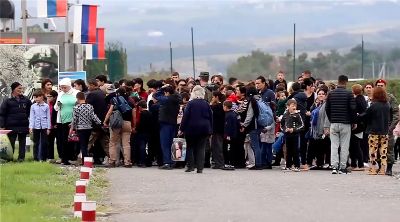A human tragedy is taking place at this very moment and the world has failed to prevent it. The rapid takeover of the Armenian-majority region of Nagorno-Karabakh by Azerbaijani forces, has led to the rapid and substantial departure of its inhabitants, and has deeply impacted the extensive Armenian diaspora globally. Still grappling with the memories of a genocide from a century past, they are now concerned about the potential loss of a region they deem integral to their historical heritage.
The autonomous ethnic Armenian administration in Nagorno-Karabakh declared on Thursday its intent to dissolve, asserting that the unrecognized republic is expected to discontinue its de-facto independence by the end of the year.
Despite the swift military action by Azerbaijan in the region last week, the government says it is committed to upholding the rights of the Armenian inhabitants of the territory. Nevertheless, as of Thursday morning, Armenian officials reported that over 60% of Nagorno-Karabakh’s population, approximately 74,400 individuals, have sought refuge in Armenia, and the number continues to grow.
The conflict is a protracted geopolitical and territorial dispute between Armenia and Azerbaijan over the Nagorno-Karabakh region, a 1,400 square mile area located within the internationally recognized borders of Azerbaijan but predominantly inhabited by ethnic Armenians. The roots of the conflict can be traced back to the early 20th century when both nations claimed the territory. The tensions were subdued during the Soviet era when the USSR established the Nagorno-Karabakh Autonomous Oblast within the Azerbaijani SSR. However, as the Soviet Union began to dissolve in the late 1980s, the region’s ethnic Armenian majority expressed a desire to either join Armenia or declare independence, leading to skirmishes and then full-scale warfare between Armenia and Azerbaijan in the early 1990s.
A ceasefire was brokered in 1994, but the conflict remained frozen with both sides holding onto their positions and the status of Nagorno-Karabakh remaining unresolved. Sporadic clashes occurred over the subsequent decades, culminating in more intensive flare-ups, including significant military engagements in 2016 and 2020. Multiple international bodies, including the Organization for Security and Co-operation in Europe (OSCE), have sought to mediate a permanent solution, but a comprehensive peace agreement has remained elusive. The conflict has led to significant human casualties, displacement of populations, and has been characterized by both parties alleging human rights abuses.
According to the AP, “Many in Armenia and the diaspora fear a centuries-long community in the territory they call Artsakh will disappear in what they call a new wave of ethnic cleansing. They accuse European countries, Russia and the United States – and the government of Armenia itself – of failing to protect ethnic Armenians during months of blockade of the territory by Azerbaijan’s military and in the lightning blitz earlier this month that defeated separatist forces.”
Armenians say the loss is a historic blow. Many in the diaspora had pinned dreams on it gaining independence or being joined to Armenia. But this dream is now nothing short of a nightmare as Armenians flee out of fear of reprisal on the part of Azerbaijani forces. Many of them do not believe the promises made by the government in Baku to protect their rights.
The Biden administration says it has been heavily involved for a long time in efforts to convince Baku to arrive at a peace agreement with the Armenian minority. Unfortunately, those efforts appear to have borne no fruit. USAID chief Samantha Powers is on the ground observing the mass exodus, calling for the UN and international aid organizations to assist in alleviating the crisis to whatever extent they can.
But this crisis highlights a glaring and important lack of ability on the part of the international community to actually prevent crises that affect thousands if not millions of people. This crisis, coupled with the war in Ukraine, demonstrates that the UN is powerless to stop genocide or ethnic cleansing.
Perhaps it is time to rethink how international bodies operate and arrive at new ways for countries to gather together in a forum that has the power to prevent such wide-scale tragedies.
Condemnations are simply not enough.
